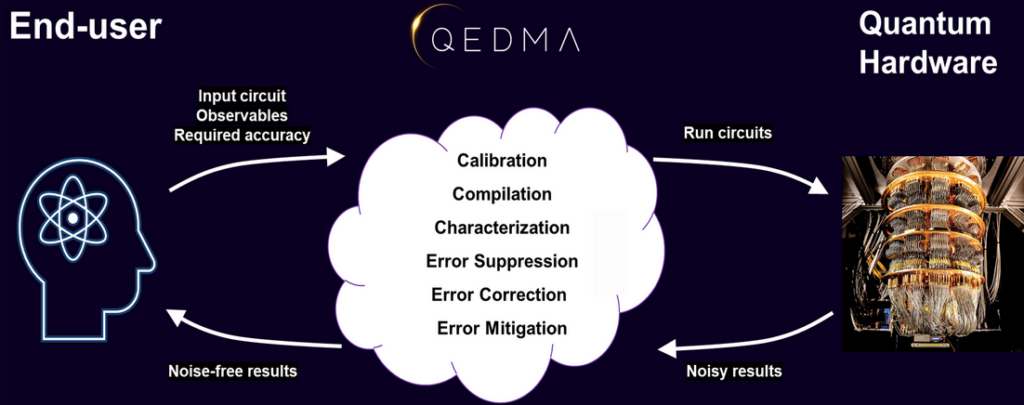QESEM
Qedma’s error reduction software
QESEM overview
The main problem of today’s quantum processing units (QPUs) is noise, consisting for example of decoherence and calibration errors. These effects significantly deteriorate the accuracy of the output of already very small quantum algorithms run on current devices. To address this issue and enable effective use of quantum computers, today, Qedma has developed QESEM: a world-top Quantum Error Suppression and Error Mitigation software for current QPUs. QESEM enables users to obtain highly accurate results from their quantum algorithms, even though these algorithms are being run on the currently available QPUs, which are very noisy. With QESEM, customers can scale up their quantum algorithms and achieve accurate outcomes from incomparably larger quantum circuits compared to the circuit volumes that are possible to run without error mitigation, or with competing error suppression and mitigation methods. QESEM already produced accurate and provably un-biased output at the largest-circuit-volumes to date. By this, QESEM brings customers significantly closer to practical quantum advantage for their computational problems of interest. We anticipate that very-near-future improvements in quantum hardware, in tandem with QESEM, will enable circuit volumes that surpass those which can be simulated using classical algorithms and hardware.


QESEM workflow
Given a set of quantum circuits to be run, a set of observables to be measured, a required statistical accuracy and a QPU-time allocation on a particular QPU, QESEM first compiles the circuits onto a set of quantum logic operations available on the QPU. These include natively available operations, as well as additional operations calibrated by Qedma (available on selected QPUs). QESEM then efficiently characterizes errors in circuits composed of these quantum logic operations. Based on this characterization, QESEM re-compiles the given circuits into a set of circuits to be run on the QPU, and estimates the required QPU time. Once all circuits have been run and measurement outcomes have been collected, QESEM implements classical postprocessing, and reports an estimate and an error bar for each observable.
- Un-biased: QESEM outputs un-biased estimations for expectation values of observables. I.e., estimation errors are predominantly statistical, and can be reduced in a controllable manner by allowing additional QPU time.
- Large volume, accurate output: Unparalleled tradeoff between circuit-volume, statistical accuracy and QPU-time, un-attainable by competing methods and software packages.
- Scalable: QPU time depends on circuit volume, but is otherwise independent of the number of qubits.
- Application-agnostic: Applies to any quantum circuit and observable.
- Reliable QPU-time estimation: QESEM reliably estimates expected QPU-times, both before and in the beginning of each run, to support users in managing their quantum resources.
- Gate-level or pulse-level access: Gate-level access to a QPU suffices to obtain cutting edge results with QESEM. Pulse-level access allows for a further boost in performance.
- Support for a variety of state-of-the-art hardware platforms: QESEM supports has already been demonstrated on QPUs based on cross-resonance and tunable-coupler superconducting qubits, as well as trapped ions, by leading quantum hardware manufacturers. Demonstrations on additional hardware platforms is ongoing.
Target audience
QESEM is intended for developers and users of quantum applications, software, or hardware, who are interested in running quantum algorithms on quantum processing units (QPUs) today, and receiving un-biased noise-free results at circuit volumes which are otherwise inaccessible, with cutting edge statistical accuracies and QPU-times. Target audiences include:
- Research groups in universities and research centers, working on quantum algorithms, quantum many-body physics or quantum chemistry.
- Data centers. High-performance computing (“HPC”) centers which have incorporated QPUs into their classical computing hardware.
- Enterprises that are actively developing quantum algorithms aligned with their core business challenges, and are interested in becoming quantum ready, and working towards applying quantum algorithms to achieve ROI.

